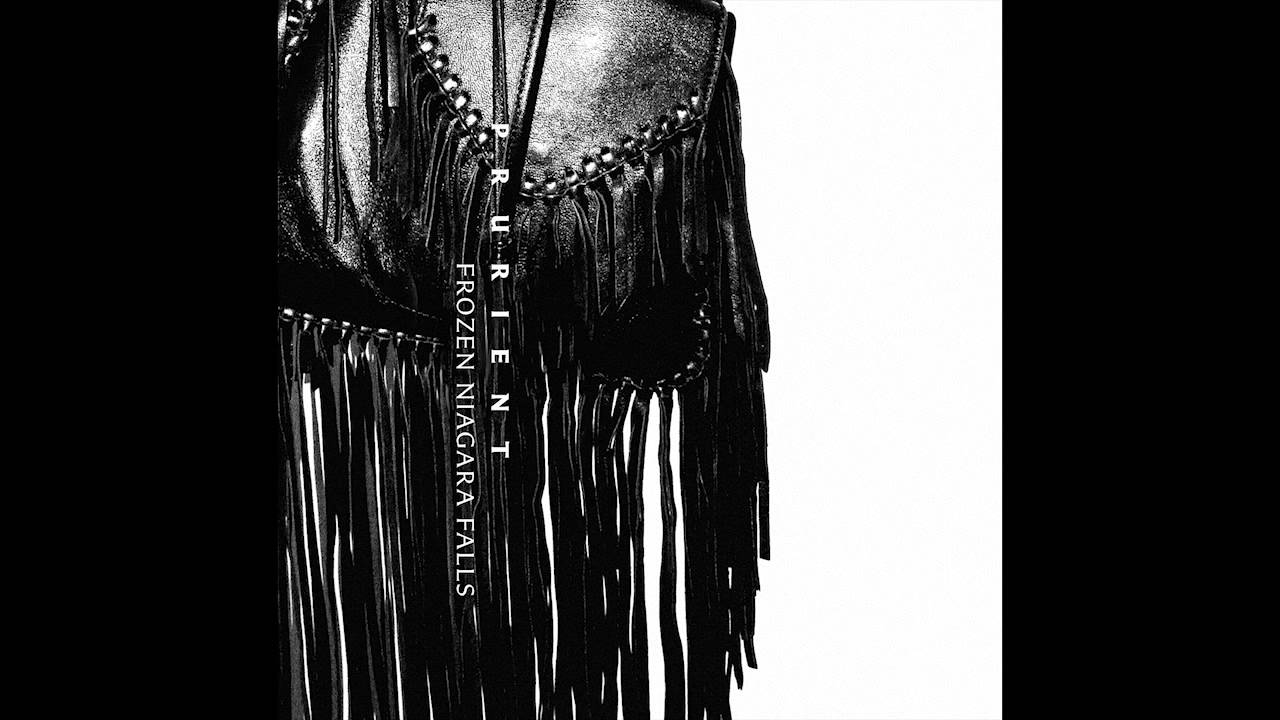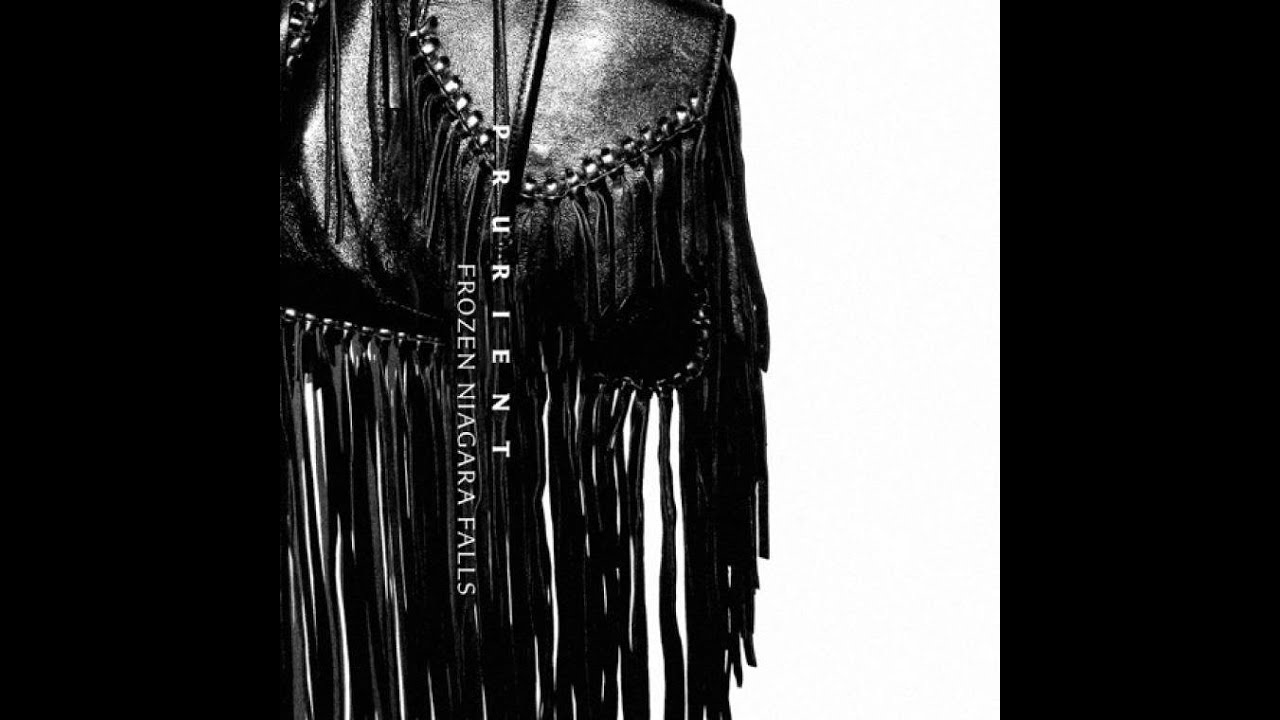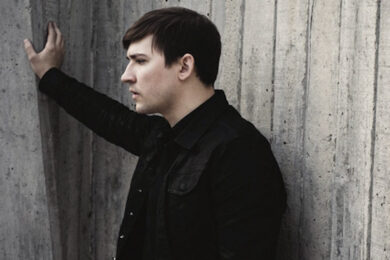I first heard Dominick Fernow who performs under the moniker Prurient back in 2006 at a gig in Kilburn, London. The stage set-up was sparse: 2 microphones, an effects board and a large beat-up amp behind him. As I remember he came on stage topless wearing a black leather glove and performed a violent set, a cacophony of feedback, white noise, harsh frequencies amidst guttural screams and cries. The physical aspect of the performance was so intense it reminded of those legendary Henry Rollins-fronted Black Flag performances I had seen footage of where Henry is pushing his body to the limit. Beyond the aggression and punishing sound there was something far deeper to it. It seemed deeply personal, like we were witnessing self-flagellation through the frequencies and mics.
Since then I’ve followed his career and musical output…or tried to – his discography spans over 150 releases. Prurient’s sound has shifted from his notorious statement in noise Black Vase (2005) to the dark wave lo-fi synths on Pleasure Ground (2006) – originally a double cassette release that came with a lock of hair. Then to ventures in electronics and dance music with Bermuda Drain (2011) and Through The Window (2013) but make no mistake, with these transitions in sound and style this isn’t someone trying to stay relevant or latching onto trends in music.
This is an obsessive following his own path and with strict discipline not to repeat himself. With his latest album Frozen Niagara Falls Prurient has made his masterwork – a 90-minute double album which encompasses moments familiar from the entire Prurient discography. His most ambitious album to date, littered with expansive harrowing, brutal yet fragile and ultimately sad.
This was originally intended as an acoustic album?
Dominick Fernow: Not acoustic instruments in particular but any acoustic sound we could generate, even at a high volume. Things being destroyed, rocks being cracked in half and hurled around and that kind of stuff.
Was that your initial concept going in?
DF: I felt in bit of a crisis in the sense that the last couple of records were so computer driven, even though there were a lot of hardware elements. It was very much exploring MIDI programming and trying to make concise, to the point, and for lack of a better word, ‘pop tracks’ in the way they might function with a verse and chorus. So I felt I kind of needed a necessity to try and return to the idea of noise committed with the physical.
Did you go in with double album in mind – were you thinking of creating something expansive?
DF: Not at all. There was no intention to make a long winded arduous self-congratulatory record, it was really quite the opposite. But the more we tried to push for any kind of restriction or narrowing in on a different direction, or a forced creativity it just became a failure one after the next, starting with an inability to find a space to create acoustic sounds.
You were going to use a barn right?
DF: Yeah it was a farm connected to an estate in rural Pennsylvania, and it didn’t work out. It’s sort of interesting the way geography works. It proved very difficult to find material and the space that was necessary in order to have acoustic sound that was powerful. It was very interesting after living in New York, LA and Europe for a little bit, as you really start to be impacted and aware of the differences within these cities and how that kind of changed what I was doing creatively. Even down to the urban planning if you will.
What did you mean when you wrote in the sleeve “Recorded in New York In the spirit of homelessness”?
DF: The record is very much connected to New York City but only really in a way that begins outside of the place. I really started working on it when I was living in Italy two years ago. I had all my stuff in storage and I was kind of continually travelling on a day to day basis and just started to think about what it really meant to have a home, and what it meant in a more abstract and spiritual sense and almost a physical sense.When you’re travelling in that kind of way it’s interesting because you’re never really present, you’re always kind of thinking about where you’re going to be next and when you have to be preparing in order to get there. I think it’s a sick way to live and for someone who travels, when you’re allowed so much time to ponder and you’re left with your thoughts it becomes very revealing.
The irony that you’re going 500 miles an hour and it feels like you’re going nowhere, you’re just stuck like hanging… like fucking stars and moon on a baby’s crib or something. You’re running in circles even though your physical reality is completely the opposite. You’re racing through space and time in this way that’s violent, and I think traveling in a lot of ways is a expression of violence, met with a sort of solitary and contemplative meditative depression. You’re always in a situation of leaving, you’re always preparing to leave rather than arriving. Just moving around living in LA, New York and Europe and traveling constantly for like 2 years it really made me ask, ‘what is a home?’ And coming back to New York after a long time…I hated it. I hated the cold, the way the things had been changed and businesses had closed and so many people I knew had left. But it still felt familiar and that was something that motivated me in that how is it the physical environment can change so much and the people you know can change continually. But it still conjured up a feeling of familiarity and I sort of began to feel that’s what home is. There’s a sort of cliché that home is the comfortable place, home is your sanctuary, where you feel safe. Home is your shelter, but I think that home is just familiarity and not necessarily comfort. In a way a sound can repeat to the point of irritating you, but can also become familiar, that’s kind of a home. And I don’t even say that’s a good or a bad thing, just a change in perception.
When I was listening back to some of your more abrasive and violent recordings it got me wondering about where these were recorded. Like something as intense as Black Vase?
DF: That was recorded in a rehearsal space, and the feedback in the room just fell into itself and shattered on the wall. It was completely absurd to record something that had so much reflection
sonically it was able to let the feedback do the work. People think that volume is an excessive crutch that comes out of some desperate need for machismo, but in the case of feedback it really
truly alters the sound in itself. You can’t really enter a place of that wild ghostly magic, sort of third ear music without having that volume and that presence, so that room was really the third member of the band on that record.
Since you’ve released over 150 projects how do you consider the listener as they attempt to
follow your work? I remember Wolf Eyes saying something along the lines of it’s a diary and whatever you release is fine.
DF: I don’t know if I would call it a diary. More a necessity. I’m certainly not proud of having a gluttonous shameful discography like that.
Why shameful?
DF: I have a lot of regrets. When I go back and look through I’m horrified at what a mess it is but at the same time it is a part of it. That chaos and the missed opportunities, and mistakes and excess is sort of an important aspect of what makes something feel like a Prurient record. To never be satisfied. If you go back to the definition of the word it comes from the Latin word meaning ‘to itch’. It’s not really about liking or disliking things or good and bad. That’s not to say it stands above criticism, I welcome the criticism. There’s no one that’s more critical of it than me in the
sense that it doesn’t necessarily function, you know, releasing an album then doing a tour. It’s more of an impulsive need in that way.
Do you have a different headspace between statement albums and smaller releases?
DF: Yes, I mean I have enough dignity to draw a distinction between a multi-format record versus an obscure cassette done for one show in the Ukraine for example.
I was trying to catch up on as many releases of yours as possible in the run up to the talk. Trying to do a mix of bigger and smaller stuff, I found some stuff I’ve bought from you at shows over the years and found myself blown away by Heavy Rain Returns.
DF: Cool! Carlos is a great guy and he really was a trailblazer who I don’t think gets enough credit for his early vision of being able to bring together these disparate forms of electronic music under the banner of noise. He was one of the first guys to be openly talking about acid techno at the same time as To Live & Shave in LA and Whitehouse.
Are you much of a collector yourself?
DF: Yes. I feel that there’s a terrible sickness and disease that happens to people throughout their music careers, when they get too involved in the record or too involved in their own band. They
sort of stop listening and become very self-absorbed and self-centred in the way they’re absorbing music and I think it’s a terrible mistake to stop listening and stop participating. As I travel I always go to record shops. I love record stores and I don’t necessarily mean these cult special novelty stores. My favourite record store ever was the virgin Megastore in Union Square. Before it closed down it was incredible to walk into a ocean of CDs and to be able to get really any genre of music, that’s much more interesting to me than this sort of obsession with formats that we’re involved in now.
The vinyl resurgence?
DF: The irony of this kind of persistence on vinyl culture, I actually see it as very materialistic although it’s coming from this subject of people who supposedly are fighting against, you know,
corporations and this kind of large business model about consumer-driven motivations. But when I had a store in the East Village many times someone would come in and ask ‘do you have
this record?’ I say ‘sure’ and hand them the CD and they say ‘oh no, I only buy vinyl’ and I say ‘well that’s your loss then, you’re missing out on this whole enormous spectrum of ideas.’ Personally I think CDs are the best format in the sense that they are so worthless as physical objects. You really just have to be confronted with the subject matter and the music itself. There’s no kind of material value. Also I think jewel cases are so cool because they’re sculptural in a way they’re boxes versus pictures. Records are sort of flat in a reductive way.
I always gravitated to CDs because of the booklet. You’d often get lyrics and a big ‘thank you’ list where they’d thank other bands and I’d do my homework and find out who they were.
DF: Oh yeah, that was the best. That era is one I greatly miss. Being limited in terms of the information that was available and having to do your own detective work, look at the shirts of who the band was wearing or who were in the thank you credits and then hunting that down through magazines or discussion, it was more engaging, active and participatory as a experience.
This record combines noise, power electronics, spoken word, dance music. Was this intentional to kind of bring together previous strains of your work. Was that planned?
DF: No, there really was no intention of coming in that direct way with a plan which is quite contradictory to how I normally work. There’s something in that in itself you know. Viktor Frankl says to never try to be successful. The harder you try the greater you will become and the only thing you can is to just do what you are passionate about and throw yourself wholeheartedly into it.





